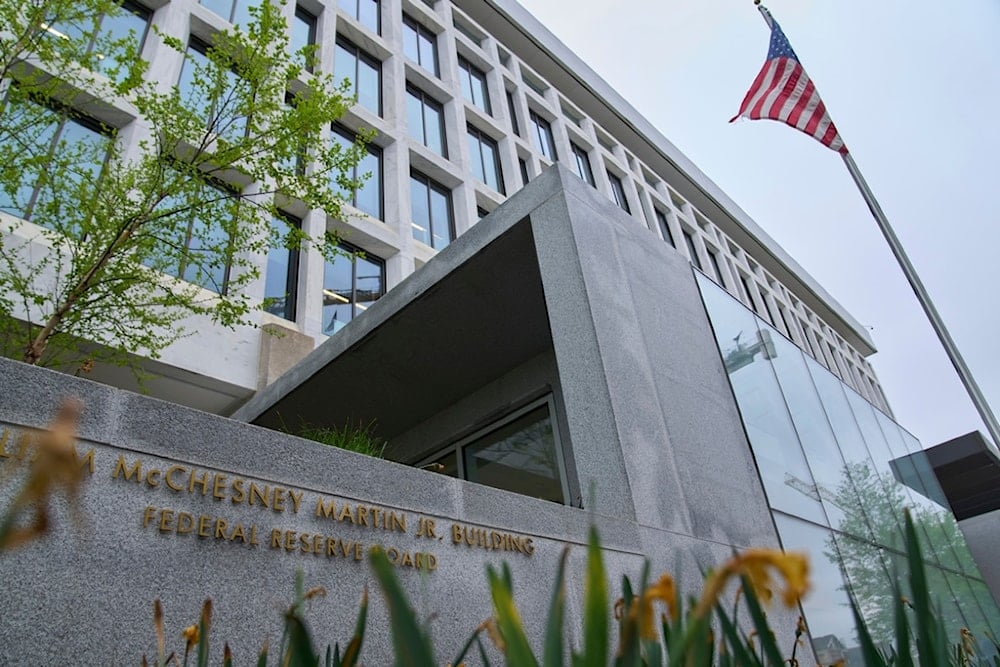Fed officials voice fears of inflation, slower growth from tariffs
Earlier today, the University of Michigan released its widely-followed consumer sentiment survey, reporting a steep decline in confidence.
-

The William McChesney Martin Jr. building, which houses the Board of Governors of the Federal Reserve System, is seen, Monday, April 7, 2025, in Washington (AP)
US Federal Reserve officials are warning of rising inflation and a slowing economy, citing the impact of President Donald Trump's sweeping tariff policy, which has rattled global financial markets.
Several central bank leaders voiced concerns over Trump's recent import duties, which were initially imposed on dozens of countries before being partially rolled back. While many tariffs were lowered to 10 percent after a sharp market response, China was left facing a combined rate of 145 percent—one of the highest in US trade history.
Boston Fed President Susan Collins, in an interview with Yahoo Finance, said the new tariffs are likely to push inflation higher and drag down growth.
"The higher the tariffs are, the more the potential slowdown in growth as well as elevation and inflation that one would expect," she said. While Collins doesn't foresee a significant downturn, she cautioned that inflation will likely rise "well above" three percent this year and signaled that interest rates may need to remain elevated. "At this point, my expectation is that we are likely to have to hold for longer than I had before," she added.
Inflation Fears
Soon after Collins spoke, the University of Michigan released its widely followed consumer sentiment survey, reporting a steep decline in confidence.
The survey also noted a sharp rise in both short- and long-term inflation expectations: "Year-ahead inflation expectations surged from 5.0 percent last month to 6.7 percent this month, the highest reading since 1981," the report stated. "Long-run inflation expectations climbed from 4.1 percent in March to 4.4 percent in April, reflecting a particularly large jump among independents."
Yikes. "Consumers have spiraled from anxious to petrified,” says Pantheon Macroeconomics.
— Heather Long (@byHeatherLong) April 11, 2025
Consumer sentiment plunged again in April. The expectations index is the worst since May 1980 (the stagflation era), according to the University of Michigan Survey of Consumers.
Americans… pic.twitter.com/wQFy158x8V
In Hot Springs, Arkansas, St. Louis Fed President Alberto Musalem warned of heightened uncertainty and stressed the need for data-driven vigilance.
"I expect the economic expansion will continue at a more moderate pace, the supply and demand for labor will remain roughly in balance, and inflation will decline to two percent over the medium term," he said. "However, I see the near-term risks as skewed toward inflation rising alongside slower economic growth and a further cooling of the labor market," Musalem added. "I would be wary of assuming the impact of high tariffs on inflation would be only brief or limited."
Read more: Fed warns tariffs on China may raise inflation, slow US growth
New York Fed President John Williams presented a more detailed outlook, estimating how both tariff and immigration policies could impact the economy.
"I now expect real GDP growth will slow considerably from last year's pace, likely to somewhat below one percent," Williams said at a conference in Puerto Rico. "With this downshift in the pace of growth... I expect the unemployment rate to rise from its current level of 4.2 percent to between 4.5 and 5 percent over the next year," he continued. "I expect increased tariffs to boost inflation this year to somewhere between 3.5 and 4 percent," Williams concluded.

 3 Min Read
3 Min Read










